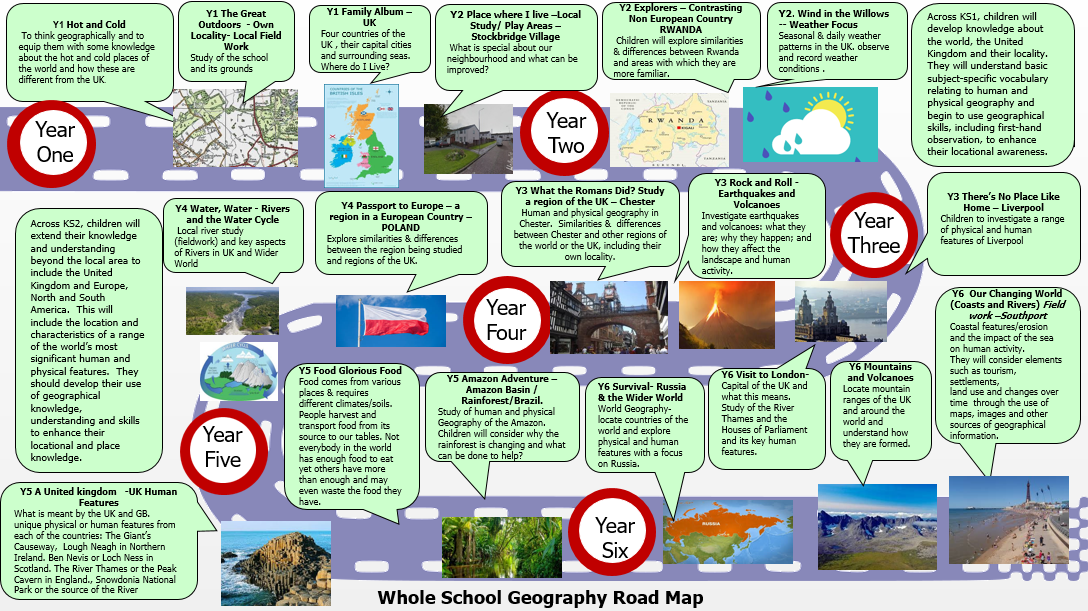Geography
Geography is taught through the Lancs Scheme which is a cross curricular approach with Geography being the main driver topic for specified themes.
- EYFS/Rec- Taught through ‘Understanding the World’
- Year 1 – Penguins Possums and Pigs (Continents, Hot and Cold Countries), The Great Outdoors (Local environment ), Family Album (UK), Weather Topic throughout the year (Seasons)
- Year 2 – Place Where I Live (Local Area Stockbridge Village) , Explorers (continents and Non EU study RWANDA) , Wind in the Willows (UK Weather and Seasons)
- Year 3 – No Place like Home (Local study Liverpool and River Mersey), Rock and Roll (Mountains, Volcanoes and Earthquakes) What the Romans Did? (UK, Chester)
- Year 4 – Passport to Europe (Europe and Poland), Water O Water (Mountains, Rivers and Water Cycle),
- Year 5 – A United Kingdom (UK, Mountains) Food Glorious food (Fairtrade and The World) Amazon Adventure (America)
- Year 6– Survival (Russia and the Wider World), Mountains and Volcanoes (UK and The World), London (UK, The River Thames), Our Changing World (Coast and Rivers, Southport Study)
Children’s geographical learning starts with the familiar and slowly builds outwards, from Stockbridge Village, to Liverpool, to the UK, to Europe, and South America. Their understanding of how their local area fits into the wider world is therefore gradually accrued. Understanding of physical geography also starts with the familiar: from the forest/seaside in Year 1, to mountains and volcanoes in Year 3 and rivers in Year 4. More in-depth studies allow children to develop their understanding of the interactions between physical and human geography, with units on Africa in Year 2, Poland in Year 4, South America in Year 5 and Russia in Year 6.
Progression within the curriculum is clear: it starts with what is familiar to children and extends outwards. Progression in fieldwork skills is built across units, with Local Visits in KS1 including the beach and the forest, to visits to Chester, Southport and London in KS2 offering rich opportunities for mapping, technical drawing and exploring their environment in a concrete physical way. Our forest school also provides ample opportunities to use the outdoors for fieldwork. Other units offer scope for children to use digital resources, globes, atlases and Geographical Information Systems to explore regions. Key technical and tier 2 vocabulary is mapped onto Knowledge Organisers and within the planning, allowing children to build a rich bank of geographical language.
Our school community has a significant number of children from a Black African or Polish background and these are a focus of our Geography curriculum alongside celebrating where all our EAL children originate from.
We take all opportunities to exploit real life Geography and we use whole school topics such as Plastics in the Ocean, Mother Earth is Weeping, and the Olympics to embed our geographical knowledge. This is reviewed annually.
Each unit is supported by a Knowledge Organiser which details the key facts, vocabulary and skills for each unit. This is sent home in advance of the unit, allowing children to make a head start on their learning.
Links are built with other subjects, predominantly, but not exclusively with writing, art, music and science.
We have an Information Station discussion each day and geographical links with mapping, people, places and politics feature very strongly in this, with the intent of widening our children’s world and local knowledge and helping them embed their geographical learning and make links.
- Primary Geography National Curriculum
- Whole School Coverage Geography Overview 2023
- Detailed Overview Geography 2023
- Geography Progression Map: EYFS-Year 6
- Geography Knowledge Organisers


